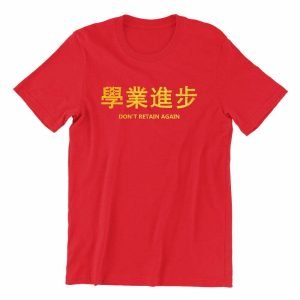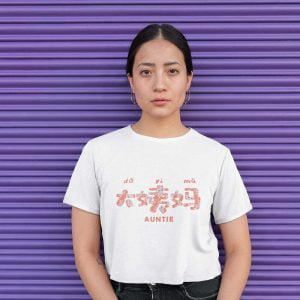Why Do Singaporeans Say ‘Quitter Never Win’ Like It’s Gospel?
Short answer: Because here in Singapore, giving up halfway is like ordering nasi lemak without chili — something just feels off. The phrase ‘Quitter never win’ is more than just a nagging echo from our school days. It’s deeply wired into our culture, our language, and believe it or not — our national identity. It may sound grammatically off to outsiders, but to us? It’s music to our kiasu-loving hearts.
-
Graphic, KaoBeiKing, T-shirts, Valentines
Price range: $30.00 through $38.00 Select options This product has multiple variants. The options may be chosen on the product page
TL;DR: What ‘Quitter Never Win’ in Singlish Really Means
- ‘Quitter never win’ is an iconic Singlish phrase that embodies perseverance and our kiasu/kiasi culture.
- It often appears in motivational contexts, school rallies, and even kopi tiam pep talks — lah, lor, and all.
- Rooted in pragmatic optimism, it reflects how Singaporeans value grit, determination, and making sure we don’t lose out.
- Its grammatical quirks highlight the hybrid beauty of English, Malay, Hokkien, and other influences on Singlish.
- At heart, it’s a rally cry — uniquely local, hilariously blunt, and instantly recognisable as #OnlyInSG.
The Importance of Perseverance in Singlish Culture
Let’s be real — Singapore isn’t exactly the land of chill. We’re a nation that built Changi Airport while other countries were still using typewriters. We got here because we hustle, full stop. So it’s no surprise that our language, Singlish, reflects that same hardworking spirit.
Take ‘Quitter never win’, for example. It sounds simple — maybe even a touch kampung-school — but you’d be surprised how often it pops up in serious conversations. From National Day speeches to neighbourhood aunties convincing you not to give up on your piano ABRSM exam (ya even if you fail three times), this phrase is like verbal Tiger Balm — everywhere, warming, and a little bit pungent with wisdom.
Just like how ‘die die must try’ reminds us food is love and effort is everything, ‘Quitter never win’ is about holding on like a true-blue Singaporean would — gripping tighter than someone on a packed MRT during peak hour. This importance of perseverance in Singlish culture runs so deep that we’ve created entire vocabularies around not giving up.
-
Chinese, KaoBeiKing, Singlish/Hokkien, T-shirts, Typography, Women
Price range: $30.00 through $38.00 Select options This product has multiple variants. The options may be chosen on the product page -
Chinese, Chinese New Year, Ladies, Mens, T-shirts
Price range: $35.00 through $43.00 Select options This product has multiple variants. The options may be chosen on the product page
Famous Singlish Quotes and Their Origins
The phrase likely morphed from the English expression ‘Quitters never win, and winners never quit’. But Singaporean practicality shaved off the fluff. We dropped the plural-s, tossed aside excessive grammar, and served it up straight: ‘Quitter never win’. Simple. Efficient. Efficient like our ERP gantries, no?
Language is very much like hawker food — adapted, rejigged, boiled down to the good stuff. So the import became localised, upgraded with the Singlish spice — just like how ‘I don’t want’ became ‘dowan’ and ‘never mind’ became the universal ‘nvm lah’.
‘Quitter never win’ is now a linguistic badge of honour, used when things get tough — exams, competitions, bidding for Carousell items… You name it. Among famous Singlish quotes and their origins, this one stands out because it perfectly captures our no-nonsense approach to motivation.
Cultural Significance of Resilience in Singaporean Expressions
In a country obsessed with meritocracy, it figures that perseverance is practically a national sport. And yes, there’s a reason this phrase feels familiar — it’s often tossed around right after you hear something like:
- ‘You think this one easy ah? Cannot so easily give up one hor.’
- ‘Fail once only what? Try again lah.’
- ‘Don’t be so soft — where your Singapore spirit?’
We’re not just about finishing first, we’re about showing up, trying again, and doing it with that gritty smile that says, ‘I may be tired, but I still press on’ — or more accurately in Singlish, ‘I damn sian, but still must do lah.’ These Singaporean colloquial phrases carry the weight of our collective identity.
Embracing Failure and Success in Singlish
Now here’s the kicker: even though we hate losing, we also have a ‘fail then how?’ mindset that’s quite forgiving. As much as we threaten our kids with PSLE doom, we also go, ‘Aiya, fail already then learn lor’.
‘Quitter never win’ and its cousin phrases — ‘don’t give up lah’, ‘must try again one’, ‘you give up now you regret later’, are ways we embrace both success and failure. We treat success as something earned over trial, tears, and tendonitis. And if you bungle? Nvm — try again.
This paradox is peak Singaporean: we worship success, but failure is not fatal — as long as you don’t throw in the towel prematurely. Which is also why Singlish phrases don’t focus on perfect outcomes, but resilient attitudes.
-
Chinese, Chinese New Year, KaoBeiKing, T-shirts, Typography, Women
Price range: $30.00 through $38.00 Select options This product has multiple variants. The options may be chosen on the product page
So remember: it’s not about failing per se. It’s about failing with style… then bouncing back with kopi-C siew dai in hand.
From Colloquialism to Identity Marker
Let’s take a quick reality check: most of us don’t speak Queen’s English 24/7 (unless you’re on Channel 5 dramas). We lace our sentences with ‘lah’, ‘meh’, and that infamous ‘can or not?’ because it’s what feels right. It’s authentic.
‘Quitter never win’ doesn’t just inspire, it identifies. It marks you out as Singaporean. You could be anywhere in the world — London, New York, or Yishun — say those three words and the nearest Singaporean will nod, knowingly.
What’s more, Singlish is emotional shorthand. It compresses volumes of meaning in short bursts of sound. ‘Quitter never win’ holds swipe-card access to stories of tenacity, fumbles at IPPT, and picking ourselves up after poly project disasters. Real talk: no language does tough love better than ours.
How Singlish Reflects Singaporean Identity
There’s a kind of comfort in Singlish phrases like ‘Quitter never win’. They cut through pretense and get straight to the juice. Whether spoken by heartland uncles, secondary school teachers, or hawker buddies, it connects us. It reminds us: Eh, we all got same roots lah.
In fact, Singlish expressions hold the same function as traditional folklore in other cultures. Language preserves identity — uniquely tailored to our roads, our stalls, our weather, our MRT breakdowns. These origins of Singaporean expressions tell the story of who we are.
Each time you say ‘Quitter never win’, you’re basically reaffirming: ‘I am part of this shared madness called Singapore.’ This is exactly how Singlish reflects Singaporean identity — through shared understanding, cultural values, and collective resilience.
Frequently Asked Questions
Is ‘Quitter never win’ proper English?
Nope — but who cares? It’s not meant to be Queen’s English but Singlish, which values essence and emotion over grammar. It gets the point across with local flavour.
Where did ‘Quitter never win’ come from?
It’s a shortened, Singaporean-ised form of the original English phrase “Quitters never win”. Locals adapted it into a tighter, snappier, more impactful form.
Why do Singaporeans use Singlish even in serious situations?
Because Singlish connects us. It strips down formality and brings people closer. In serious moments, it offers warmth, familiarity, and sometimes humour.
How does Singlish show our national values?
Singlish phrases often highlight ideas like hard work, humility, resilience, and practicality. ‘Quitter never win’ reflects our cultural bias for persistence and going the distance.
Can using Singlish be seen as unprofessional?
In formal contexts, maybe. But it’s entirely appropriate — and even powerful — in casual, local, or emotionally charged conversations. It’s a powerful identity tool.








